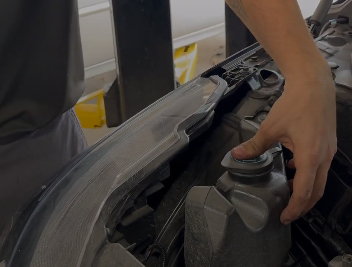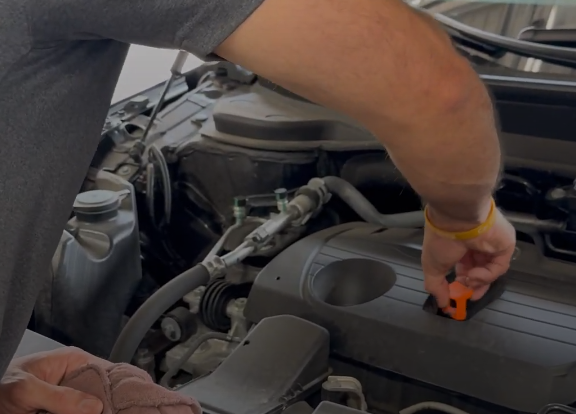Fluid Inspection: Why It’s Essential for Your Vehicle's Longevity
The Importance of Regular Fluid Inspection for Vehicle Health and Longevity
Keeping your vehicle in good shape is super important, and one of the best ways to do that is through fluid inspection. Regularly checking the fluids in your car can help avoid bigger problems down the road. It's not just about making sure everything runs smoothly; it's about keeping you safe and saving money in the long run. In this article, we'll explore why fluid inspection is key to your vehicle's health and longevity.

Key Takeaways
- Regular fluid checks can prevent serious vehicle issues.
- Fluid quality directly affects your car's performance.
- Neglecting fluid inspections can lead to costly repairs.
- A simple inspection can enhance your vehicle's safety.
- Stay informed about your vehicle's fluid needs for better maintenance.
Understanding Fluid Inspection
What Is Fluid Inspection?
Okay, so what is fluid inspection? Basically, it's taking a look at the different fluids in your car to make sure they're at the right levels and in good condition. We're talking about things like your oil, coolant, brake fluid, power steering fluid, and transmission fluid. It's not just about topping them off; it's about checking for leaks, discoloration, or any other signs that something might be wrong.
Think of it as a quick health check for your car's vital systems.
Importance of Fluid Levels
Why bother checking fluid levels? Well, imagine trying to run a marathon without enough water. Your car feels the same way when its fluids are low. Low fluid levels can lead to all sorts of problems, from overheating to poor performance and even major damage. For example, if your engine oil is low, parts start grinding against each other, and that's a recipe for disaster. Keeping an eye on those levels can save you a lot of headaches and money down the road. Regular
fluid checks are not just another chore on your maintenance list.
Common Fluids to Inspect
Alright, let's talk about the usual suspects. Here's a quick rundown of the fluids you should be checking regularly:
- Engine Oil: Keeps everything lubricated and running smoothly.
- Coolant: Prevents overheating and freezing.
- Brake Fluid: Essential for stopping safely.
- Power Steering Fluid: Makes turning the wheel easier.
- Transmission Fluid: Helps your car shift gears properly.
Each of these fluids plays a critical role in your vehicle's operation. Ignoring them is like ignoring a warning light on your dashboard – it's only going to get worse. Make sure to consult your owner's manual for specific recommendations on fluid types and intervals.
The Impact of Fluid Quality on Performance
How Contaminated Fluids Affect Your Vehicle
Contaminated fluids can wreak havoc on your vehicle's performance. Think of it like this: your car's systems are designed to work with fluids that have specific properties. When these fluids become contaminated with dirt, debris, or other substances, they lose their ability to do their job effectively.
This can lead to reduced efficiency, increased wear and tear, and even system failures. For example, contaminated engine oil won't lubricate as well, causing friction and heat buildup. Similarly, dirty transmission fluid can cause slipping and rough shifting. It's like trying to run a marathon with rocks in your shoes – eventually, something's gotta give.
- Reduced lubrication
- Increased friction
- Overheating
Signs of Fluid Degradation
Knowing the signs of fluid degradation can save you a lot of trouble down the road. Keep an eye out for these common indicators:
- Changes in Color or Odor: Fresh fluids typically have a distinct color and smell. If you notice that your engine oil is milky or your coolant smells burnt, it's a sign that something's not right.
- Unusual Noises: Strange sounds coming from your engine or transmission can indicate that the fluids aren't doing their job properly. For example, a whining noise from your power steering could mean low or contaminated power steering fluid.
- Decreased Performance: If your car feels sluggish or isn't performing as well as it used to, it could be due to degraded fluids. This might manifest as poor acceleration, rough shifting, or difficulty braking.
Ignoring these signs can lead to more serious problems, so it's always best to address them promptly. Regular fluid checks are a simple way to stay on top of things.
Maintaining Optimal Fluid Quality
Maintaining optimal fluid quality is all about prevention. Here's what you can do:
- Follow the Recommended Maintenance Schedule: Your vehicle's manufacturer provides a maintenance schedule that outlines when to change each fluid. Sticking to this schedule is the easiest way to ensure that your fluids stay in good condition.
- Use the Right Fluids: Using the wrong type of fluid can cause serious damage to your vehicle. Always use the fluids that are recommended in your owner's manual.
- Check Fluid Levels Regularly: Low fluid levels can also affect performance. Make it a habit to check your fluid levels regularly and top them off as needed.
| Fluid | Recommended Change Interval | Notes |
|---|---|---|
| Engine Oil | 3,000-7,500 miles | Depends on driving conditions and oil type |
| Transmission Fluid | 30,000-60,000 miles | Check for leaks and unusual shifting |
| Coolant | 30,000-50,000 miles | Use a coolant tester to check its condition |
| Brake Fluid | Every 2 years | Brake fluid absorbs moisture, which can reduce its effectiveness |
| Power Steering | 50,000 miles | Check for leaks and unusual noises |
By taking these steps, you can keep your vehicle running smoothly and avoid costly repairs. Regular maintenance is key.
Fluid Inspection and Vehicle Safety
Preventing Brake Failures
Brake fluid is super important for your car's braking system. If the fluid is low, old, or contaminated, it can seriously mess with your ability to stop. Think about it: brake fluid transfers the force from your foot on the pedal to the brakes themselves. If it's not doing its job, you could end up in a really bad situation. Regular fluid checks and flushes can help prevent brake failure and keep you safe on the road.
Avoiding Engine Overheating
Coolant, or antifreeze, is what keeps your engine from overheating. It circulates through the engine, absorbing heat and then dissipating it through the radiator. If your coolant level is low or the fluid is old and broken down, your engine can overheat, which can cause major damage.
Overheating can lead to a blown head gasket or even a cracked engine block, which are both super expensive to fix. Keeping an eye on your coolant and making sure it's in good condition is a simple way to avoid a lot of trouble.
Ensuring Proper Steering Function
Power steering fluid is what makes it easy to turn the wheel. If the fluid is low or contaminated, your steering can become stiff and difficult, especially at low speeds. This can make it harder to control the car, especially in emergency situations.
- Check the power steering fluid level regularly.
- Look for any leaks around the power steering pump or hoses.
- Make sure the fluid is clean and not dark or sludgy.
Ignoring your power steering fluid can lead to pump failure, which is a costly repair. More importantly, it can compromise your ability to steer the car safely. Don't skip this simple check.
Cost Savings Through Regular Fluid Checks
Preventing Major Repairs
Think of it this way: a small leak caught early is way cheaper than a blown engine. Regular fluid checks help you spot those little problems before they turn into huge, wallet-draining disasters. It's like going to the doctor for a check-up – you'd rather catch something early than wait until you're in the emergency room, right? Ignoring your fluids is like ignoring that weird noise your car is making – it's probably not going to fix itself. Instead, consider
complete vehicle inspections to identify potential issues early.
Extending Vehicle Lifespan
Your car's fluids are like its lifeblood. Keeping them clean and at the right levels keeps everything running smoothly. When your engine, transmission, and other components are properly lubricated and cooled, they don't have to work as hard. This reduces wear and tear, which can significantly extend the lifespan of your vehicle. It's simple: well-maintained fluids = a longer-lasting car. Neglecting this aspect can lead to premature aging and costly replacements down the road.
Improving Fuel Efficiency
Believe it or not, your car's fluids can affect how much gas you use. For example, old, sludgy engine oil can make your engine work harder, which means it needs more fuel. Similarly, low transmission fluid can cause the transmission to slip, also reducing fuel efficiency.
By keeping your fluids in good condition, you can improve your gas mileage and save money at the pump.
Here's a simple breakdown:
- Clean engine oil: Better lubrication, less engine strain, improved MPG.
- Properly filled transmission fluid: Smooth gear changes, reduced slippage, better MPG.
- Adequate coolant: Optimal engine temperature, efficient combustion, better MPG.
Regular fluid checks are a small investment that pays off big time. Not only do they prevent expensive repairs and extend the life of your vehicle, but they can also improve your fuel efficiency, saving you money every time you fill up.
Fluid Inspection as Part of Routine Maintenance
It's easy to overlook fluid checks, but they're a big deal for keeping your car running smoothly. Think of it like this: your car's fluids are like its blood. If they're low or dirty, things start to go wrong. Making fluid inspections part of your regular maintenance can save you a lot of headaches (and money) down the road.
Creating a Maintenance Schedule
Okay, so how do you actually make this happen? First, check your car's manual. Seriously, it's got all the info you need about when to check and change fluids. A good starting point is to check your fluids every month. Mark it on your calendar, set a reminder on your phone – whatever works for you.
Consistency is key here. Don't just wait until something feels off. Regular
oil checks and changes as per your manufacturer's recommendations can prevent a lot of problems.
What to Expect During an Inspection
When you take your car in for a routine check-up, fluid inspection should be part of the deal. The mechanic will look at the levels of all the important fluids: oil, coolant, brake fluid, power steering fluid, and transmission fluid. They'll also check the quality of the fluids. Are they clean? Are they the right color? Any weird smells? All these things can tell a mechanic a lot about what's going on inside your car. They'll also look for any leaks. Catching a small leak early can prevent a major repair later.
Regular fluid checks are not just another chore on your maintenance list; they're a proactive way to keep your vehicle healthy and avoid costly repairs.
Choosing the Right Service Provider
Not all mechanics are created equal. You want someone who's thorough and trustworthy. Ask around for recommendations. Read online reviews. Look for a shop that specializes in your type of car. And don't be afraid to ask questions. A good mechanic will be happy to explain what they're doing and why. Make sure they use quality fluids that meet your car's specifications. A cheap fluid might save you a few bucks now, but it could cost you a lot more in the long run.
Here's a simple checklist to consider when choosing a service provider:
- Reputation: Check online reviews and ask for recommendations.
- Experience: Do they have experience with your car's make and model?
- Transparency: Are they willing to explain their process and answer your questions?
- Quality: Do they use high-quality fluids and parts?
The Role of Technology in Fluid Inspection
Advanced Diagnostic Tools
Okay, so back in the day, checking your fluids was pretty basic. Dipsticks, visual inspections... you get the idea. Now? It's a whole different ballgame. We've got advanced diagnostic tools that can tell you way more than just "low" or "dirty." Think about it: sensors that analyze fluid composition in real-time, checking for contaminants, viscosity, and all sorts of other stuff.
These tools help mechanics pinpoint problems before they become major headaches. It's like having a mini-lab under the hood.
Fluid Analysis Techniques
Fluid analysis has come a long way. It's not just about looking at the color anymore. Labs can now perform in-depth spectroscopic analysis to identify the specific types and amounts of contaminants present in a fluid sample. This helps determine the source of the contamination and the extent of the damage. For example, finding metal shavings in your oil could indicate engine wear, while coolant in your transmission fluid is a sign of a serious problem.
Benefits of Technology in Inspections
Technology is making fluid inspections faster, more accurate, and more informative. Here's a few benefits:
- Early Detection: Catches problems before they cause major damage.
- Improved Accuracy: Provides precise data on fluid condition.
- Reduced Downtime: Helps mechanics diagnose issues quickly and efficiently.
Using technology in fluid inspections means less guesswork and more informed decisions about vehicle maintenance. It's about getting the most out of your car and keeping it running smoothly for longer.
Educating Yourself on Fluid Maintenance
Understanding Fluid Types and Functions
Okay, so you want to get a little more hands-on with your car's fluids? Smart move! First things first, you gotta know what each fluid actually does.
Engine oil keeps things lubricated, coolant prevents overheating, brake fluid makes your car stop, power steering fluid helps you steer, and transmission fluid keeps your gears shifting smoothly. Each one has a specific job, and using the wrong fluid can cause some serious problems. Think of it like using the wrong kind of soap in your dishwasher – things just won't work right.
DIY Fluid Checks
Alright, feeling brave enough to check your fluids yourself? Here's the lowdown:
- Find the dipsticks: Your engine oil and transmission fluid usually have dipsticks. Pull them out, wipe them clean, reinsert them fully, and then pull them out again to check the level. Make sure it's within the
Wrapping It Up: Keep Your Vehicle Running Strong
In the end, taking care of your vehicle means more than just filling up the gas tank. Regular fluid inspections are a big part of keeping everything running smoothly. They help catch small issues before they turn into big headaches, saving you time and money down the road. Plus, they keep your car safe to drive, which is what really matters. So, don’t skip those inspections! Make it a habit to check your fluids and get your vehicle looked at regularly. Your car will thank you, and you’ll enjoy a smoother ride for years to come.
Frequently Asked Questions
What is fluid inspection?
Fluid inspection is checking the different fluids in your vehicle to make sure they are at the right levels and in good condition. This helps keep your car running smoothly.
Why are fluid levels important?
Fluid levels are important because if they are too low or dirty, they can cause serious problems in your car, like engine overheating or brake failure.
What fluids should I check regularly?
You should regularly check engine oil, coolant, brake fluid, transmission fluid, and power steering fluid. These are essential for your vehicle's performance.
How does dirty fluid affect my car?
Dirty fluid can cause parts of your car to wear out faster and can lead to breakdowns. It can also reduce your car's efficiency.
How often should I have my fluids checked?
It's a good idea to have your fluids checked at least once every six months or during regular maintenance visits.
Can I check my vehicle's fluids myself?
Yes, you can check some fluids yourself, like engine oil and coolant. However, for a thorough inspection, it's best to have a professional do it.












